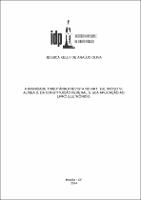Use este identificador para citar ou linkar para este item:
https://repositorio.idp.edu.br//handle/123456789/3153Registro completo de metadados
| Campo DC | Valor | Idioma |
|---|---|---|
| dc.contributor.author | Oliva, Jéssica Kelly de Araújo | - |
| dc.date.accessioned | 2021-08-19T18:45:29Z | - |
| dc.date.available | 2021-08-19T18:45:29Z | - |
| dc.date.issued | 2014-04-01 | - |
| dc.identifier.citation | OLIVA, Jéssica Kelly de Araújo. A imunidade tributária prevista no art. 150, inciso VI, alínea D, da constituição federal, e sua aplicação ao livro eletrônico. 2014. 68 p. Monografia de Especialização (Pós-graduação em Direito Tributário). Instituto Brasileiro de Ensino, Desenvolvimento e Pesquisa, Brasília, 2021. | pt_BR |
| dc.identifier.uri | https://repositorio.idp.edu.br//handle/123456789/3153 | - |
| dc.description.abstract | O presente trabalho visa analisar sobre a aplicação da Imunidade tributária prevista no art. 150, inciso VI, alínea d, da Constituição Federal, ao livro eletrônico, trata-se de matéria polêmica levando em consideração que a Constituição Federal não diz expressamente que essa imunidade só aplicaria ao “papel” destinado a impressão de livros, jornais e periódicos e também não diz que essa situação imune não se aplicaria aos livros eletrônicos. Dessa forma, será necessário analisar se haverá a prevalência da corrente restritiva, a qual pauta-se na interpretação gramatical da norma ou se haverá a preferência da interpretação extensiva da norma constitucional pautada em uma interpretação teleológica. Logo, precisaremos compreender o que é a Imunidade Tributária, qual é sua densidade normativa, ou seja, qual é o feixe axiológico que fundamenta essa situação imune para ao final concluir pela aplicação ou não aplicação da hipótese imunizante aos livros eletrônicos, os quais são provenientes da revolução tecnológica que se instaurou no contexto social na atualidade e gera inúmeras decisões divergentes no âmbito jurisdicional, tendo em vista que apesar da matéria estar com repercussão geral reconhecida, ainda não há pronunciamento definitivo sobre a matéria prolatado pelo Supremo Tribunal Federal, o qual tem por função ser o Guardião da Constituição. | pt_BR |
| dc.description.abstract | The present work analyzes on the application of tax immunity provided for in art. 150, section VI, d, of the Constitution d the e-book , it is controversial matter considering that the Federal Constitution does not expressly say that this immunity would apply only to "paper " for the printing of books , newspapers and periodicals , neither does it immune to this situation would not apply to electronic books . Thus , you need to examine whether there is the prevalence of current restrictive , which is guided in the literal interpretation of the rule or if there will be the preference of the broad interpretation of the constitutional guided by a teleological interpretation of the standard. Therefore, we need to understand what is the Tax Immunity , what is its density rules, e , what is the beam axiological underlying immune to this situation at the end to complete the application or non-application of immunizing hypothesis to eBooks , which are derived technological revolution that brought the social context today and generates numerous divergent decisions under judicial review , given that despite the matter being passed with generally recognized , there is still no definitive pronouncement on the matter by the Supreme Court , which has function is to be the guardian of the Constitution. | pt_BR |
| dc.language.iso | por | pt_BR |
| dc.publisher | IDP/EAB | pt_BR |
| dc.rights | Open Access | pt_BR |
| dc.subject | imunidade tributária | pt_BR |
| dc.subject | livro eletrônico | pt_BR |
| dc.subject | interpretação gramatical | pt_BR |
| dc.subject | interpretação teleológica. | pt_BR |
| dc.title | A imunidade tributária prevista no art. 150, inciso VI, alínea D, da constituição federal, e sua aplicação ao livro eletrônico | pt_BR |
| dc.type | Tese de mestrado | pt_BR |
| dc.location.country | BRA | pt_BR |
| Aparece nas coleções: | Outras Especializações | |
Arquivos associados a este item:
| Arquivo | Descrição | Tamanho | Formato | |
|---|---|---|---|---|
| MONOGRAFIA - JÉSSICA KELLY DE ARAÚJO OLIVA.pdf | 775.92 kB | Adobe PDF |  Visualizar/Abrir |
Os itens no repositório estão protegidos por copyright, com todos os direitos reservados, salvo quando é indicado o contrário.
